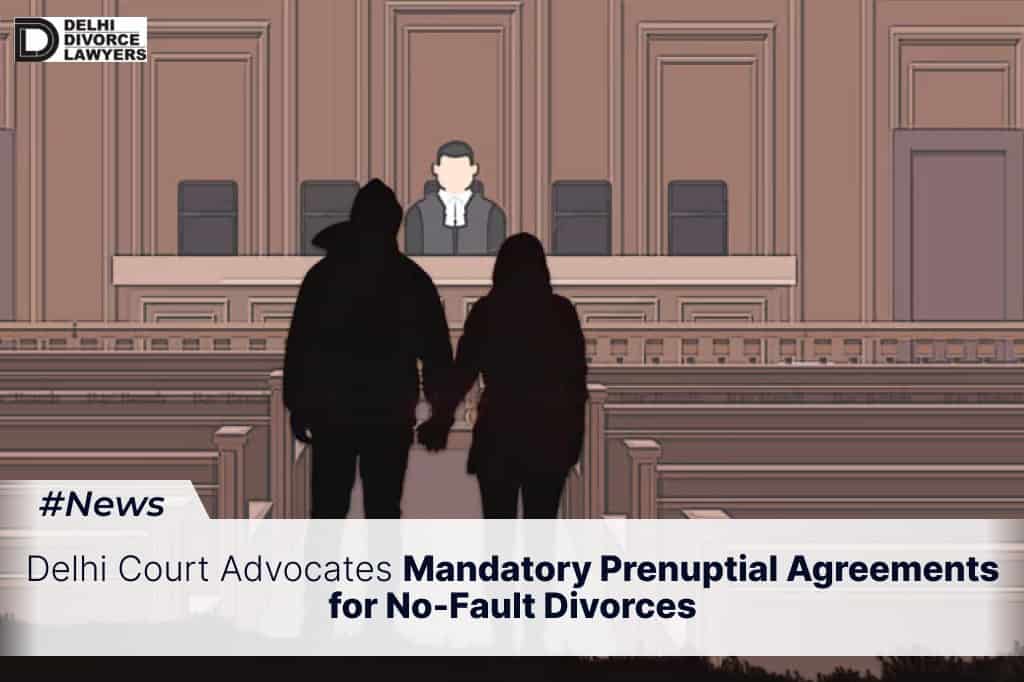The Court stressed that refusal to grant divorce would force parties to suffer further and would amount to “law-induced mental cruelty.”
In a recent legal judgment, a Delhi court has advocated the compulsory incorporation of prenuptial agreements as a prerequisite for matrimonial unions. The primary objective of this recommendation is to ameliorate the emotional distress commonly experienced by parties embroiled in legal conflicts. This pronouncement was articulated by Family Court Judge Harish Kumar during the adjudication of a no-fault divorce case at the Patiala House Courts, which entailed a protracted legal dispute spanning a seven-year duration involving a married couple.
“Time has come to make compulsory prenuptial agreement to be executed before appointed authority after counseling of the parties about the possible risk of marriage going haywire for variety of reasons and making it mandatory to report breach every time breach occurs under intimation to the party allegedly at fault, making it further clear that if breach not reported he/she would not be heard later on that he/she did not report thinking that she/he would improve,” the Court said.
In a recent legal proclamation, a Delhi court has proffered a recommendation for the compulsory incorporation of prenuptial agreements as a prerequisite for marital unions. This proposal’s primary objective is to ameliorate the psychological distress often experienced by litigants entangled in legal conflicts. The said proclamation emanated from Family Court Judge Harish Kumar, presiding over a no-fault divorce case at the Patiala House Courts, which pertained to a couple embroiled in an extended legal dispute spanning a duration of seven years.
“This Court, therefore, in the present case in the facts and circumstances as noted above, without going into question as who is at fault so as to allow husband’s or wife’s prayer for dissolution of their marriage on fault theory, hereby dissolve their marriage under Section 13B of the Hindu Marriage Act, 1955 taking their respective prayer to dissolve their marriage (based on the faults of other) as their respective consent to dissolve their marriage, from the date of decree to be drawn up following this judgement,” the Court said.
The Court has noticed a significant increase in marriage-related disputes recently, and many of these cases don’t have clear evidence of actual cruelty. However, if one party decides to seek a divorce for any reason, they can only do so by starting legal proceedings and making accusations against the other party, following the judge’s guidance.
“[These allegations] snowball into counter allegation and Court of law is pressed into service to find out something which never existed because difference of opinion and disagreements are also reported as an act of cruelty. Till such time real effort is made by the society as whole and the legislature in particular, temple of justice will keep on devising way to respond to the grave situation,” the Court added.
The couple, who got married in 2011 and had a child, both wanted a divorce, but they couldn’t agree on important things. This led to the need for legal help.
Judge Kumar carefully looked at the case and decided that in situations where the marriage was in serious trouble, there were big problems, and it couldn’t be fixed, it wouldn’t be fair to stop the divorce. The Court said that refusing a divorce just because one person couldn’t prove the other did something wrong would make both people suffer for longer, no matter who was at fault.
The Court also said that not allowing a divorce in such cases would make the people involved go through a lot of stress due to long legal processes. The Court also understood that some might think this decision was a way to avoid looking closely at the evidence during the legal process. But the judge explained that it’s better for the state and society to solve tough problems, especially in families, to make things more peaceful and harmonious.
“Spirit of the Family Court Act is also to bring out settlement between the parties, which means putting quietus to their dispute. In the present case if prayer of husband or wife is accepted holding the other spouse guilty of matrimonial offense, the person against whom findings would go will take the matter to higher forum thus drag the other into rigmarole of further round of litigation with added agony and harassment. Similarly, refusal of their respective prayer, if they failed to prove their allegation, would also lead to law induced mental cruelty as discussed above,” the Court explained further.
In the matter of child custody, the Court has duly designated both parents as joint legal custodians, conferring upon them the responsibility for making decisions pertaining to their child’s educational pursuits, scholastic activities, and extracurricular engagements. Moreover, it is mandated that the mother undertake the inclusion of the father’s name within their daughter’s school records.
Given the shared geographical proximity of both parents’ residences within the Gurugram locale, the Court has accorded the father the privilege of daily visitation and weekend overnight access to their daughter.
In the realm of financial support, the Court has decreed an equitable distribution of responsibilities, obligating both parents to equally share the financial burden by bearing 50% of the expenses associated with the upbringing and care of their daughter.

